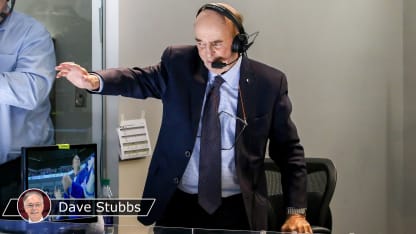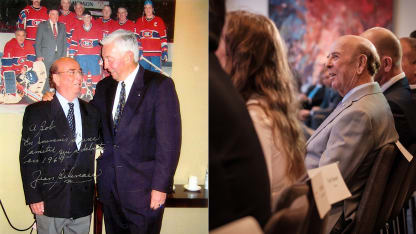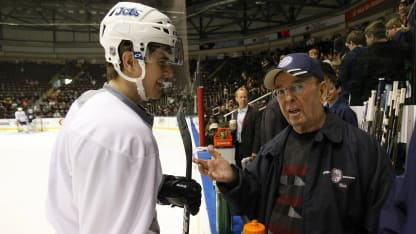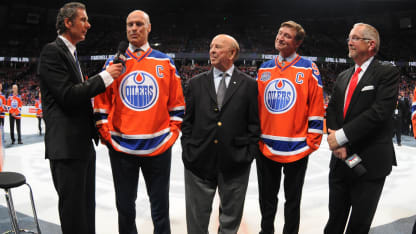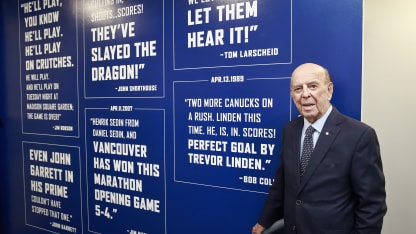Bob Cole's cherished photograph with late Montreal Canadiens icon Jean Beliveau, the inscription translated: "To Bob, In memory of a friendship that began in 1969." At right, Cole at the 2018 NHL Alumni Gala, at which he was honored.
Cole will try to treat Saturday, the regular-season finale for the Maple Leafs and Candiens, like any other game day, attending a morning skate, in this case Toronto's at Bell Centre. He will return to his hotel and be back at the arena late afternoon for a light pregame meal in the media lounge -- "I love the milk in Montreal, I don't know what they're feeding the cows up there, but it's great," he says.
Then he'll walk up the 20 stairs to the eighth floor, back down 22 to the Passarelle Lecavalier-Gallivan -- the media gallery named for late, legendary Canadiens broadcasters Rene Lecavalier and Danny Gallivan -- and the roughly 125 steps a little more than a quarter of the way around the ice surface to descend 15 more stairs to the broadcast booth directly over center ice.
Cole's four children will be in Bell Centre Saturday, Megan and Robbie coming from Vancouver, Christian and Hilary from Newfoundland. It's fitting that they're flying in from coast to coast, because that's been Cole's hockey landscape for 50 years.
"They've done it on their own," Cole said of their travel, enormously proud that they'll be in the building. "They wouldn't even touch me with it because they knew I wouldn't hear of it."
Whether cheering for the Canadiens or Maple Leafs, it's safe to assume that more than one fan will record the game for posterity, not for the action on the ice but for the voice calling it. The 85-year-old spoke to NHL.com from his home in St. John's, Newfoundland, about 60 minutes of hockey ahead, and 50 years that have preceded it.
The Montreal Canadiens home to the Toronto Maple Leafs on a Saturday night, telecast nationally on "Hockey Night in Canada." Is there a better place for you to be?
"No, there isn't. And I just hope it's a meaningful game."
Do you have a favorite memory in Montreal, having called 50 years of NHL games in this city?
"The Canadiens' most recent Stanley Cup victory in 1993, the most recent by a team from Canada, is a good one. But that's a tough question. I've done so many games. To me, they're all pretty well great games. Some are better than others, but I love the crowd in Montreal. They help you get excited no matter what you're thinking. In any building, you're aware of the atmosphere when it's dull, when it's a listless crowd. It's harder to work. But when the crowd is alive, you just feel good about what you're doing. It's why the game is so great, the excitement of it all. You can't find that in baseball or football or anything. You can have a series of shots, the goalie is standing on his head, as they say, for maybe only 15 seconds, but 20,000 people are roaring. You don't get that everywhere."
